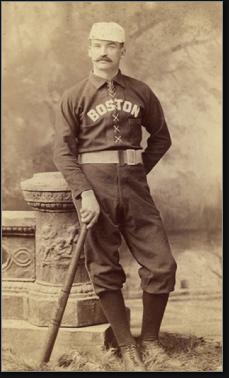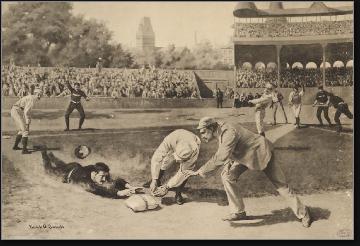
Sport: Baseball
Born: December 31, 1857
Died: November 8, 1894
Town: Paterson
Michael Joseph Kelly Jr. was born December 31, 1857 in Troy, NY and grew up in Paterson, NJ. Mike’s father enlisted in the Union Army in 1862 and the family joined him in Washington DC when he reenlisted near the end of the Civil War. There Mike first played baseball. He greatly admired George McClellan, the flamboyant Union General who ran against Abraham Lincoln in 1864. Mike continued to play after the family moved to New Jersey and settled in Paterson.
Mike lost his mother and father to illness when he was 13 and found work in a silk factory hauling buckets of coal. He thought he might learn to be a weaver, but his love of baseball and his skill at the game attracted the attention of a local semipro team, the Paterson Keystones, who made him their catcher at the age of 15. On the same team were two boyhood friends, Jim McCormick and Eddie Nolan. Along with captain Blondie Purcell, they made a formidable foursome—good enough to beat some of the finest pro and semipro clubs in the region.
At the age of 17, Mike signed his first professional contract, with the Buckeyes in Columbus, OH. In 1878, the Cincinnati Red Stockings signed Mike at the age of 20. The Red Stockings already had one of the game’s best catchers in Deacon White, so Mike moved to the outfield. The following year, he blossomed into one of the National League’s finest hitters, batting .348 and finishing among the leaders in hits and runs. That winter, Mike joined Purcell and some other big-league stars on a California barnstorming trip. There he met Cap Anson, captain of the Chicago White Stockings, who signed Mike to a contract for the 1880 season.
With the one-two punch of Anson and Kelly, Chicago ran away with the National League pennant, winning nearly 80 recent of their games. Kelly was the most talked-about player in baseball. He developed trick plays on the field and was a bon vivant off of it. Over the next few seasons, he would popularize the hit-and-run, hook slide and a number of other clever plays that advanced the sport. The White Stockings won the pennant again in 1881 and Mike—who now went by the nickname “King” Kelly—returned to Paterson after the season to marry his girlfriend, Agnes. The White Stockings won a third straight pennant in 1882.
In 1884, the NL changed its rules to allow overhand pitching. Averages plummeted, but Mike was unfazed and batted .354 to lead the league. He topped the NL with 120 runs that season and again in 1885 with 124. Chicago won its fourth pennant in six seasons. In 1886, Mike had his best year, winning the batting title with a .388 average and scoring a league-high 155 runs. He also stole 55 bases. The White Stockings repeated as pennant winners.

After the season, Chicago sold Mike to the Boston Beaneaters for the then-unheard of sum of $10,000. A much-copied “Slide, Kelly, Slide” painting of Mike barreling head-first into second base (left) soon graced the wall of almost every Irish bar in Boston. He batted .322 for his new team and stole 84 bases.
In 1890, Mike accepted to be the player-manager of Boston’s team in the newly formed Players League. The league folded after the season and he signed with the Cincinnati Reds of the American Association in 1891. Unfortunately, Mike was done as a big-time star at this point. The wear and tear and drinking had eroded his skills. The team was renamed Kelly’s Killers in his honor but he didn’t last the year. Cincinnati released him in August and he returned to Boston. He played 20 games with the New York Giants in 1893, who let him go after the season. In 1894, Mike was out of baseball and performing on the vaudeville circuit.
In the late autumn of 1894, Mike left Paterson for a booking in Boston, traveling from New York by boat. A winter storm struck and he had no overcoat. He caught a cold which quickly worsened and he was admitted to a hospital. Mike passed away the night of November 8th at the age of 36. His funeral in Boston drew 7,000 people.
As a player, Mike glamorized baseball and contributed to both its popularity and the way it was played. Umpires often joked that half the rules in the book were created to keep King Kelly from puling a fast one. He was one of the first celebrities to hand out his autograph and was larger than life despite standing under six feet tall and weighing 180 pounds in his prime. The song “Slide, Kelly, Slide” remained popular for decades after his death, sung by fans who never saw him play.
Mike was enshrined in the Hall f Fame in 1945.